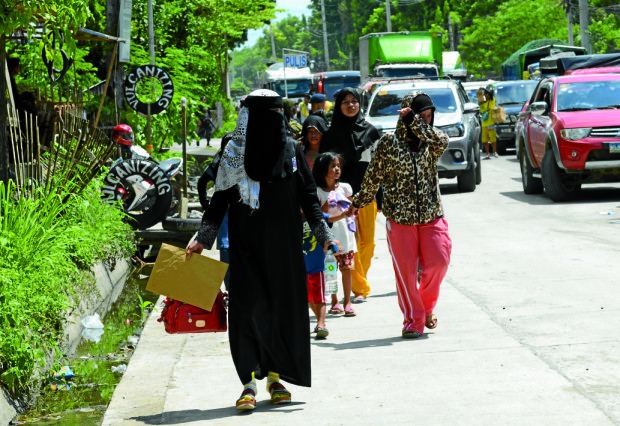Martial law in Mindanao ‘justified and needed’ — retired SC justice

Police officers check evacuees from Marawi aboard a van at a checkpoint by the entrance of Iligan City in of Mindanao on May 24, 2017. President Rodrigo Duterte warned that martial law would be “harsh” and like a dictatorship, after imposing military rule in the south to combat Islamist militants. (Photo by TED ALJIBE / AFP)
President Rodrigo Duterte’s decision to impose martial law in the entire Mindanao was “justified and needed” following hostilities between government forces and the local terrorist Maute group in Marawi City, according to retired Supreme Court Associate Justice Vicente Mendoza.
“You cannot speak of violation of the Bill of Rights when there’s martial law and the suspension of the privilege of the writ of habeas corpus is effective,” Mendoza told the Philippine Daily Inquirer in a telephone interview on Wednesday.
“You cannot speak of that because you have to look at it from the military’s point of view,” he explained. “If you’re the military, will you go to the court to get a warrant? No more. You will just arrest suspected rebels.”
He said the initial information provided by authorities showed that there was “really a need” to place Mindanao under military rule and to temporarily revoke the privilege of the writ of habeas corpus.
“Based on what I have heard, I think there’s rebellion over there in Marawi and that public safety really requires the declaration of martial law,” Mendoza said. “If the President’s judgment is correct or not in declaring martial law, it’s not for me nor for anyone (to decide). That is the prerogative of the President.”
Article continues after this advertisementMendoza, who served as in the 15-member Supreme Court from 1994 to 2002, said the presumption was that the chief executive “acted correctly” in exercising his authority.
Article continues after this advertisement“If anyone wants to challenge that, (he or she) has to challenge that in the court,” he said.
He said the government could also carry out warrantless arrests even without suspending the privilege of the writ of habeas corpus.
However, Mendoza said the state could not prevent the court from scrutinizing the legality of warrantless arrests.
“That’s the difference,” he noted. “If the privilege of the writ of habeas corpus is suspended, the court will not entertain you. Your petition will be dismissed at once.”
Restrictions on travel and assembly
Pacifico Agabin, the former law dean of the University of the Philippines, said the government could also restrict the people’s right to travel and the freedom of assembly while martial law was in effect.
“If the privilege of the writ of habeas corpus is suspended, you cannot hold public meetings and speak against the government. Complete silence,” he said. “You cannot travel to the area where there’s fighting. Freedom of movement can also be suspended in places which the military determines (as unsafe).”
The Integrated Bar of the Philippines (IBP) also expressed its support for the President’s decision.
“(T)he national leadership of the IBP sees no reason to question the declaration at this time,” the lawyers’ group said in a statement.
It said the 1987 Constitution authorized Duterte to exercise such power while institutionalizing “remedies and safeguards against the abuse of that authority.”
The IBP also reminded government troops to “wield this power with caution” and to observe the rule of law at all times.
“We will remain steadfast in our commitment to uphold and defend the Constitution and vigilant against those who intend to curtail and our fundamental freedom,” said the IBP.
/atm
RELATED VIDEO